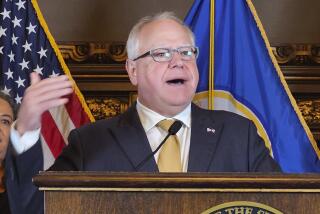Shows Some Strength for All Early Democratic Contests : Gephardt Advances by Avoiding Errors in Campaign
- Share via
DES MOINES — On the back wall of her cramped office at Richard A. Gephardt’s campaign headquarters here, Laura Nichols has lined up a morbid little rogues’ gallery--a row of grainy, black-and-white newspaper photos of the Democratic presidential contenders who never made it through 1987. And across the face of each one who has fallen, Gephardt’s Iowa press secretary has slashed a big fat X.
It takes that kind of merciless score card to keep track of the Democratic presidential field this year. Many whose prospects seemed so bright are now gone; some of the party’s most promising candidates have paid dearly for the errors of their ways.
But Nichols’ man, Gephardt, is one who has yet to make a big mistake.
Just Campaigning
In fact, while Gary Hart was womanizing, Joseph R. Biden Jr. plagiarizing and Michael S. Dukakis leaking, Gephardt was just busy campaigning. Hart and Biden have dropped out of the race. Massachusetts Gov. Dukakis remains in, with an overwhelming lead in New Hampshire.
While the nation has been transfixed by the public destruction of Hart, the humiliation of Biden and the awkward embarrassment of Dukakis, Dick Gephardt has been gradually picking up support by steadfastly not doing anything wrong, which may be the highest compliment any candidate can receive in 1987.
His only close call: when his campaign was erroneously accused by the Biden staff of covertly supplying videotapes to the press showing Biden plagiarizing on the stump. Gephardt was quickly vindicated, however, when the Dukakis camp confessed.
Since that near-miss, his campaign has had a simple watchword: careful.
That cautious approach came in handy in a recent Gephardt appearance at a state education convention in San Francisco, when an avowed lesbian teacher asked Gephardt a rather loaded question about how he would protect homosexual teachers from being banned from public school classrooms.
Pressed by Activist
Perhaps with an eye to how his response would play in the Midwest and South, Gephardt said simply: “Well, if I was President, you wouldn’t get Robert Bork on the Supreme Court.” When the gay activist pressed further, Gephardt merely repeated his answer, ended his question session and left the convention stage.
“Long-shot candidacies can rarely survive major blunders, and, as Dick is still relatively unknown, we obviously don’t want to make a mistake,” said Mark Johnson, a Gephardt spokesman. “When he talks to people, he chooses his answers carefully. But he also listens to them and engages them, and he will really answer their questions.”
After almost nonstop campaigning here in Iowa and across the nation for more than two years, Gephardt has had plenty of time to learn how to avoid major blunders on the hustings. Now, he seems quite capable of casting complex issues in understandable terms without engaging in demagoguery, most notably on his central theme--the need for fair trade practices to force other nations to open their markets to American products.
Careful Trade Talk
Indeed, he is careful to avoid controversy on the trade issue, averting phrasings that might provide ammunition to those who want to dismiss him as nothing more than a Japan-bashing protectionist.
The 46-year-old Missouri congressman has carefully honed a straightforward, Midwestern-style message about fair trade and industrial strength, and more broadly about the need for Trumanesque honesty and integrity in the Oval Office.
“The days for leadership by rhetoric are over; the days for leadership by example and role model are here,” Gephardt says in his typical stump speech. “I want to be the kind of President that people look at and say that’s the way we ought to act, that’s the way we ought to be. No more shredding and lying, no more secret military operations, I want to be a President who lives by the Constitution. . . . The tone, the ethic, the morality of this country, what we are really all about, starts at the top.”
Seems Honest, Appealing
If Gephardt’s often flat speech delivery remains unexciting, his simple words still seem honest and appealing to many Democrats reeling from the carnage the party has suffered this year at the hands of more charismatic candidates who have so quickly self-destructed.
“On the downside, people down here don’t find Gephardt that exciting,” said Loch Johnson, a political scientist at the University of Georgia. “But what I’m hearing is that people like him because he looks so wholesome, and clean-cut and honest.”
For many party activists, especially here in Iowa, Gephardt also has one other major asset that makes them forget he is no Jesse Jackson or Biden on the stump--he seems electable. Private Republican polls reportedly show that Gephardt now holds the most appeal of any Democratic candidate among Republican and centrist Democratic voters in the Midwest.
‘Most Electable’
“I feel we have to nominate someone who can win the White House, so that’s why I picked him,” said Mike Peters, an influential Iowa state legislator from Sioux City. Peters had previously been one of Biden’s strongest supporters in the state, with deep emotional and ideological ties to the Delaware senator. Last week, however, Peters endorsed Gephardt for far more practical reasons. “Gephardt is the most electable candidate of all,” he said.
So Gephardt now looks like the political equivalent of a sensible shoe, a candidate who pushes the same themes with the same tone wherever he speaks. He has slowly built a solid base that has put him in a position to benefit from his rivals’ missteps.
Today, in fact, Gephardt seems to be the only Democrat who can claim to be running relatively well in all of the early battlegrounds of the 1988 contest--Iowa, New Hampshire and the South.
Weaknesses of Others
Although Illinois Sen. Paul Simon is challenging Gephardt in Iowa, he is said to have little strength in New Hampshire or the South. Although Dukakis holds an overwhelming lead in New Hampshire and has built a huge campaign staff in Iowa, he has yet to gain much visibility in the South. And although Tennessee Sen. Albert Gore Jr. is gaining momentum in the South, he has little going for him in Iowa or New Hampshire.
By contrast, Gephardt has shown at least some strength everywhere.
Not only was he the first Democrat to campaign in Iowa way back in April, 1985, but also he has already visited some Southern states 25 times. More importantly, his key positions on trade and agriculture seem well suited to campaigns in many of the early contests, especially now that the stock market crash has sent jitters through consumers, focusing even greater attention on jobs and the economy.
“I don’t think a regional strategy is going to elect anybody President,” Gephardt said. “We are running a good, active campaign in all these states; we’re talking about the issues that I think people want to know about, and we’re talking about them with specificity, which I think the voters want, and I think we’re going to do well.”
Aided by Farm Bill
Still, Iowa remains his strongest bastion. Gephardt’s sponsorship of the Harkin-Gephardt farm bill, a radical approach to the farm crisis that is supported by militant farm groups, has won him strong support in the most rural sections of the state.
In effect, it would allow farmers to form a Midwestern cartel on major crops, by giving them the power to jointly set limits on crop production. The bill would eliminate most federal crop subsidies but its production limits would lead to a doubling of corn and soybean prices by reducing supplies.
“Once farmers have had a chance to talk to him and listen to him, they come over and support him, because he’s pretty much saying what we believe we need,” said Carroll Nearmyer, a Prairie City, Iowa, farmer who heads the state chapter of the American Agriculture Movement, which has endorsed Gephardt.
In addition, his tough stance on trade has gained him strong labor support in Iowa, especially among members of the United Auto Workers, the most powerful union in the state, which represents workers in Iowa’s hard-hit farm machinery industry.
Seven Field Offices
To top it off, he has already campaigned here a total of 89 days, has opened seven field offices and hired 36 staffers in the state and even got his mother to move to Des Moines from St. Louis to campaign here full time for him. By early November, he will have visited all 99 counties in Iowa at least once and most of them many more times than anyone cares to remember.
Thus, Gephardt is now widely thought to be among the leaders in Iowa, locked in a battle for first place with Simon.
In the South, meanwhile, local political leaders say Gephardt is running second only to Gore for the votes of white Democrats. Gephardt’s support for an oil import fee that would effectively raise oil prices to $24 per barrel has won him strong support from oil interests in Texas and other oil states.
Endorsements from about 35 fellow House members from all across the South have also tapped Gephardt into important local fund-raisers throughout the region; 40% of his campaign’s revenues now come from the South, excluding Missouri. “Right now, Gephardt is much better organized in Texas than Gore,” said Bob Slagle, chairman of the Texas Democratic Party.
Support in Alabama, Carolinas
His trade policies have also won him support in Alabama, where the steel industry has been battered by foreign competition, and in the Carolinas, where textile jobs have disappeared under a flood of imports.
In New Hampshire, Gephardt now bills himself as the “New England Alternative” to Dukakis. Earlier this month, in fact, Gephardt did surprisingly well in winning committed delegates to a December state party convention. Although the delegate selection process had no bearing on next year’s New Hampshire primary, the contest was seen as a test of statewide organizational strength.
“In the early organizing efforts, Gephardt has done about as well as anybody,” said Michael Barone, a Washington political analyst.
Still, the real trick will be to see if error-free politics will be exciting enough to help Gephardt actually win somewhere. His well-balanced support will not mean much if he only comes in second everywhere.
Best Chance
Steve Murphy, Gephardt’s new Iowa campaign manager, acknowledges that Iowa represents his best chance for victory. Yet a loss here would be devastating, especially after Gephardt has devoted so much time and energy to the Iowa campaign. And right now, Simon’s increased strength in the state seems threatening.
But Gephardt insists that he does not worry about the horse race aspects of the campaign. He just keeps moving, taking his message to as many voters as will listen.
“I think the big thing is to just get out there and say why you’re running and what you believe in, and what the issues are, and that’s what I’ve tried to do,” Gephardt said. “I think that’s awfully important, especially with the economy in jeopardy.”
More to Read
Get the L.A. Times Politics newsletter
Deeply reported insights into legislation, politics and policy from Sacramento, Washington and beyond. In your inbox twice per week.
You may occasionally receive promotional content from the Los Angeles Times.










